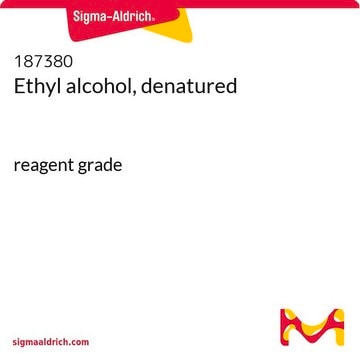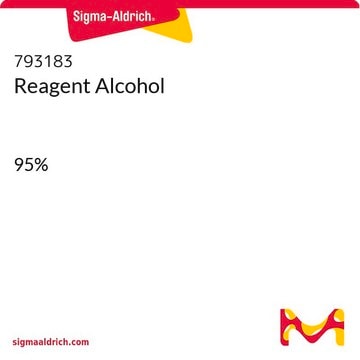676829
Reagent Alcohol
anhydrous, contains 5% isopropyl alcohol and 5% methyl alcohol as denaturant
Sinónimos:
Ethyl alcohol, Reagent alcohol, Ethanol, RGA, denatured alcohol
About This Item
Productos recomendados
Nombre del producto
Reagent Alcohol, anhydrous, ≤0.005% water
grade
anhydrous
Quality Level
vapor density
1.59 (vs air)
form
liquid
contains
5% isopropyl alcohol as denaturant
5% methyl alcohol as denaturant
expl. lim.
3.1-27.7 % (lit.)
concentration
100%
impurities
≤0.005% water
evapn. residue
≤0.0005%
bp
78 °C (lit.)
mp
−130 °C
SMILES string
OCC
InChI
1S/C2H6O/c1-2-3/h3H,2H2,1H3
InChI key
LFQSCWFLJHTTHZ-UHFFFAOYSA-N
¿Está buscando productos similares? Visita Guía de comparación de productos
Categorías relacionadas
General description
Application
- Microfluidically Assisted Synthesis of Calcium Carbonate Submicron Particles with Improved Loading Properties: Research on microfluidically synthesized calcium carbonate submicron particles shows enhanced loading properties, offering potential advancements in drug delivery systems and other nanotechnology applications (Ermakov AV, et al., 2023).
- Recent Developments in CaCO3 Nano-Drug Delivery Systems: Advancing Biomedicine in Tumor Diagnosis and Treatment: A review focusing on recent advancements in the development of calcium carbonate-based nano-drug delivery systems, which have significant potential to improve tumor diagnosis and therapy (Lin C, et al., 2024).
Components
greener alternative product
signalword
Danger
hcodes
Hazard Classifications
Eye Irrit. 2 - Flam. Liq. 2 - STOT SE 2
target_organs
Eyes,Central nervous system
Storage Class
3 - Flammable liquids
wgk_germany
WGK 2
flash_point_f
48.2 °F - closed cup
flash_point_c
9 °C - closed cup
ppe
Eyeshields, Faceshields, Gloves, type ABEK (EN14387) respirator filter
Elija entre una de las versiones más recientes:
¿Ya tiene este producto?
Encuentre la documentación para los productos que ha comprado recientemente en la Biblioteca de documentos.
Los clientes también vieron
Nuestro equipo de científicos tiene experiencia en todas las áreas de investigación: Ciencias de la vida, Ciencia de los materiales, Síntesis química, Cromatografía, Analítica y muchas otras.
Póngase en contacto con el Servicio técnico







